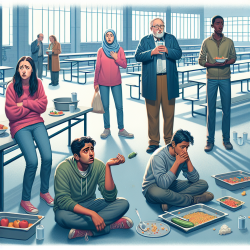Food insecurity is a pressing issue that affects millions globally, with significant implications for both mental and physical health. A recent study titled "Adolescent-Reported Household Food Insecurity and Adolescents’ Poor Mental and Physical Health and Food Insufficiency in Kenya" sheds light on the unique perspectives of adolescents in understanding household food dynamics. This research highlights the importance of incorporating adolescent reports alongside adult reports to gain a comprehensive view of food insecurity and its impacts.
The Importance of Adolescent Perspectives
Traditionally, assessments of household food insecurity have relied heavily on adult reports. However, emerging research underscores the value of adolescent insights. Adolescents often experience food insecurity differently than adults, not only through the availability of food but also through psychosocial processes such as anxiety and social isolation.
The study conducted in Kenya revealed that 36% of adolescents reported household food insecurity compared to 63% of adults. This discrepancy highlights the need for practitioners to consider both perspectives to accurately assess the situation and tailor interventions accordingly.
Key Findings and Implications
- Mental Health Impact: The odds of experiencing mental health difficulties were highest when adolescents alone reported food insecurity. This emphasizes the critical role that adolescent awareness plays in their mental well-being.
- Physical Health Outcomes: Both adolescent and adult reports were significant predictors of poor self-rated physical health among adolescents. However, when both reported food insecurity, the impact was more pronounced.
- Nutritional Sufficiency: Adult reports were more closely aligned with severe food insufficiency outcomes, such as eating one or fewer meals per day. This suggests that while adults manage household resources, adolescents’ experiences are crucial for understanding broader health impacts.
Practical Applications for Practitioners
For practitioners working with adolescents, integrating these findings into practice can enhance the effectiveness of interventions aimed at addressing food insecurity. Here are some strategies to consider:
- Diverse Reporting: Encourage both adolescents and adults to report on household food security to capture a complete picture.
- Mental Health Support: Recognize the link between food insecurity and mental health issues. Implement programs that provide psychological support alongside nutritional assistance.
- Community Engagement: Engage communities in discussions about food security to raise awareness and reduce stigma associated with seeking help.
The Need for Further Research
This study provides a foundation for further exploration into the dynamics of food insecurity in different contexts. Future research could delve deeper into the specific psychosocial mechanisms through which food insecurity affects adolescents, as well as explore interventions that address both nutritional and nonnutritional outcomes.
To read the original research paper, please follow this link: Adolescent-Reported Household Food Insecurity and Adolescents’ Poor Mental and Physical Health and Food Insufficiency in Kenya.










